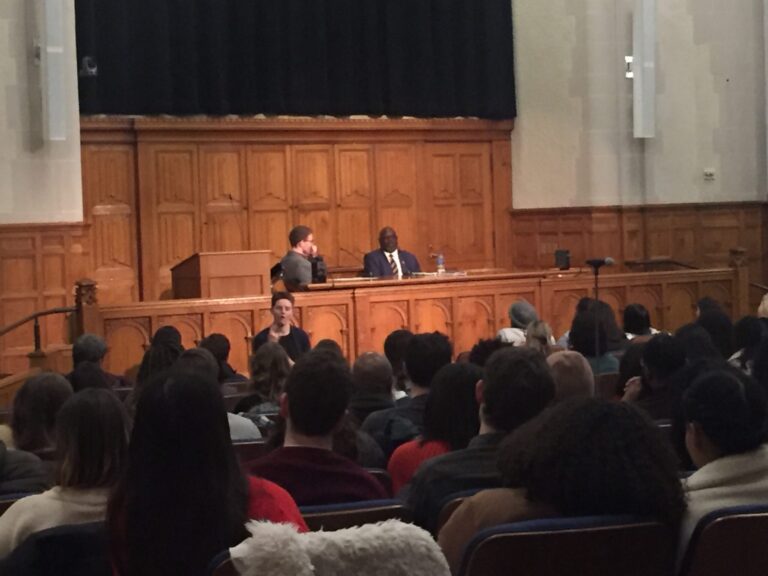All content categorized with: Judicial Analysis
Filter
Post List
Revising the Indian Plenary Power Doctrine
The federal Indian law doctrine of Congressional plenary power is long overdue for an overhaul. Since its troubling nineteenth-century origins in Kagama v. United States (1886), plenary power has justified invasive Congressional interventions and undermined Tribal sovereignty. The doctrine’s legal basis remains a constitutional conundrum. This Article considers the Court’s…A Theory of Racialized Judicial Decision-Making
In this Article, I introduce a theory of racialized judicial decision-making as a framework to explain how judicial decision-making as a system contributes to creating and maintaining the racial hierarchy in the United States. Judicial decision-making, I argue, is itself a racialized systemic process in which judges transpose racially-bounded cognitive schemas as they make decisions. In the process, they assign legal burdens differentially across ethnoracial groups, to the disproportionate detriment of ethnoracial minorities. After presenting this argument, I turn to three mechanisms at play in racialized judicial decision-making: (1) whiteness as capital that increases epistemic advantages in the judicial process, (2) color-evasive approaches as effective tools to justify racially disparate outcomes, and (3) the elevation of racial discrimination into a status of exceptionalism that justifies heightened standards in proving racial anti-discrimination claims. I argue that the racialized judicial decision-making process reproducing the social racial hierarchy is institutionalized via the legitimacy courts wield. I conclude with a discussion on the agency and autonomy inherent in the judicial decision-making process, emphasizing judicial decision-making is not simply a reflection of ideology—personal or otherwise—individual biases, or cultural tides, and can as a system be leveraged to further racial equity in a democratic society.Toward Self-Determination in the U.S. Territories: The Restorative Justice Implications of Rejecting the Insular Cases
Conservatives and liberals alike are increasingly calling for condemnation of the Insular Cases—a series of U.S. Supreme Court cases from the early 1900s, in which the Court developed the doctrine of territorial incorporation to license the United States’ indefinite holding of overseas colonial possessions. In March 2021, members of the U.S. House of Representatives introduced House Resolution 279, which declares that the Insular Cases should be rejected as having no place in U.S. constitutional law. Moreover, in 2022, Justice Gorsuch called for the Supreme Court to squarely overrule the cases. For many, rejecting the Insular Cases is a long-overdue reckoning for U.S. colonialism. Nonetheless, some representatives and scholars from the U.S. territories have raised concerns about potential implications for existing local laws in the territories. Many of these local laws protect Indigenous territorial peoples from further colonial harms. If the proposed bill or Supreme Court’s overruling of the cases functioned to extend the U.S. Constitution in full to the territories, these laws may be found invalid under current constitutional jurisprudence. This Article employs a contextual framework for Indigenous peoples to explore the nuanced restorative-justice implications of rejecting the Insular Cases. It emphasizes the varying perspectives of Indigenous peoples of the present-day U.S. territories, who would be most impacted by the measure. Finally, flowing from this restorative justice framework, this Article demands that any resolution to the Insular Cases forward the human rights principle of self-determination for Indigenous peoples—not mere equality.“Professional” Hairstyles: How Title VII Protections Have Condoned the Policing of Black Women’s Hair
By Jasmine BenjaminAssociate Editor, Vol. 26 Everyone is faced with the question of how to style their hair. However, this decision is of particular social, professional and economic import for Black women. According to recent studies, Black women are 83% more likely to report being judged more harshly on their…Predicting Supreme Court Behavior in Indian Law Cases
This piece builds upon Matthew Fletcher’s call for additional empirical work in Indian law by creating a new dataset of Indian law opinions. The piece takes every Indian law case decided by the Supreme Court from the beginning of the Warren Court until the end of the 2019-2020 term. The scholarship first produces an Indian law scorecard that measures how often each Justice voted for the “pro- Indian” outcome. It then compares those results to the Justice’s political ideology to suggest that while there is a general trend that a more “liberal” Justice is more likely to favor the pro-Indian interest, that trend is generally weak with considerable variance from Justice to Justice. Finally, the article then creates a logistic regression model in order to try to predict whether a pro-Indian outcome is likely to prevail at the Court. It finds six potential variables to be statistically significant. It uses quantitative analysis to prove that the Indian interest is more likely to prevail when the Tribe is the appellant, when the issue is framed as a jurisdictional contest, and when the case arises from certain regions of the country. It suggests that Indian law advocates may use these insights to help influence litigation strategies in the future.Thirteenth Amendment Litigation in the Immigration Detention Context
This Article analyzes how the Thirteenth Amendment has been used to prevent forced labor practices in immigration detention. The Article assesses the effectiveness of Thirteenth Amendment litigation by dissecting cases where detainees have challenged the legality of labor requirements under the Trafficking Victims Protection Act. Given the expansion in immigration detention, the increasing privatization of detention, and the significant human rights implications of this issue, the arguments advanced in this Article are not only currently relevant but have the potential to shape ongoing dialogue on this subject.Textualism’s Gaze
This Article attempts to address why textualism distorts the Supreme Court’s jurisprudence in Indian law. I start with describing textualism in federal public law. I focus on textualism as described by Justice Scalia, as well as Scalia’s justification for textualism and discussion about the role of the judiciary in interpreting texts. The Court is often subject to challenges to its legitimacy rooted in its role as legal interpreter that textualism is designed to combat.
Reflections from Rebellious Lawyering Conference 2020
by Becky Wasserman Associate Editor, Vol. 25 This year, a group of Michigan law students – including members of the Michigan Journal of Race & Law – traveled to New Haven, Connecticut for Yale Law School’s annual Rebellious Lawyering Conference. The mission of the conference is to convene:…
The Twenty-Eighth Amendment is Here
by Tamar Alexanian Associate Editor, Vol. 25 In January, Virginia became the thirty-eighth state to ratify the Equal Rights Amendment (ERA). But the history of the ERA spans nearly a century, and the fight isn’t over yet. What does the ERA say? The original text of the ERA was…
The Necessity of Revisiting and Overturning Lassiter v. Department of Social Services
by Raul Noguera-McElroy Associate Editor, Vol. 25 Part I: Overview Last term, I discussed how white supremacy animates the child welfare system’s aggressive push to terminate the bond between a parent and their child permanently through a child protection process known as the termination of parental rights.[i]…


